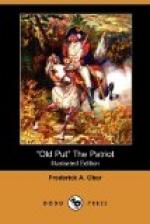It was as well that Lord Fordyce had gone up to his room—for the lady of Heronac grew white as death for a moment, and then crumpling the note in her hand she staggered up the old stone stairs to her great sitting-room.
So he had gone then—and they could have no explanation. But he had come out of the manger—and was going to let the other animal eat the hay.
This, however, was very poor comfort and brought no consolation on its wings. Civilization again won the game.
For she had to listen unconcernedly to Madame Imogen’s voluble description of Michael’s leaving—pressing business which he had mistaken the date about—finally she had to pour out tea and smile happily at Henry and Pere Anselme.
But when she was at last alone, she flung herself down by the window seat and shook all over with sobs.
Michael’s note to Henry was characteristic:
I’m bored, my
dear Henry—the picture of your bliss is
not
inspiriting—so
I am off to Paris and thence home. I hope you’ll
think I behaved all
right and played the game.
Took your motor to catch train.
Yrs.,
M.A.
CHAPTER XII
The Pere Anselme was uneasy. Very little escaped his observation, and he saw at tea that his much loved Dame d’Heronac was not herself. She had not been herself the night before at dinner either—there was more in the coming of these two Englishmen than met the eye. He had seen her with Michael in the morning in the summer-house from a corner of the garden, too, where he was having a heated argument with the gardener in chief, as well as when he met them on the causeway bridge. He felt it his duty to do something to smooth matters, but what he could not decide. Perhaps she would tell him about it on the morrow, when he met her as was his custom on days that were not saints’ days interfered with by mass.
“I shall be at the gate at nine o’clock, ma fille,” he said, when he wished her good-day. “With your permission, we must decide about the clematis trellis for the north wall without delay.”
Henry accompanied the old man on his walk back to the village—and they conversed in cultivated and stilted French of philosophy and of Breton fisher-folk, and of the strange, melancholy type they seemed to have.
“They look ever out to sea,” the priest said; “they are watching the deep waters and are conscious forever of their own and loved ones’ dangers—they are de braves gens.”
“It seems so wonderful that anything so young and full of life as Mrs. Howard should have been drawn to live in such an isolated place, does it not, mon pere?” Henry asked. “It seems incongruous.”
“When she came first she was very sad. She had cause for much sorrow, the dear child—and the sea was her mate; together she and I, with the sea, have studied many things. She deserves happiness, Monsieur, her soul is as pure and as generous as an angel’s—if Monsieur knew what she does for my poor people and for all who come under her care!”




